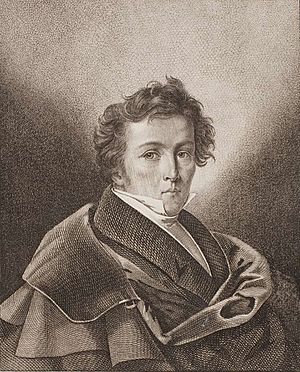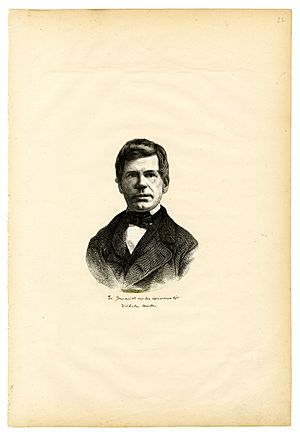Wilhelm Müller facts for kids
Quick facts for kids
Wilhelm Müller
|
|
|---|---|

Wilhelm Müller
|
|
| Born | 7 October 1794 Dessau, Anhalt-Dessau |
| Died | 30 September 1827 (aged 32) Dessau, Anhalt-Dessau |
| Notable works | Die Schöne Müllerin, Winterreise |
Johann Ludwig Wilhelm Müller (born October 7, 1794, died September 30, 1827) was a German poet. He is famous for his poems that later became song cycles by Franz Schubert. His most well-known works are Die schöne Müllerin (1823) and Winterreise (1828).
Contents
Life of Wilhelm Müller
Wilhelm Müller was born in Dessau, Germany, on October 7, 1794. His father was a tailor. Wilhelm went to a local school called a gymnasium. Later, he studied at the University of Berlin. There, he focused on languages and history.
In 1813 and 1814, he joined the Prussian army as a volunteer. He fought against Napoleon in battles like Lützen and Bautzen. After the wars, he went back to his studies in Berlin.
From 1817 to 1819, Müller traveled through southern Germany and Italy. In 1820, he wrote a book about his experiences in Italy called Rom, Römer und Römerinnen.
In 1819, he became a teacher of classics in Dessau. A year later, in 1820, he also became a librarian for the duke's library. He lived in Dessau for the rest of his life. Wilhelm Müller passed away from a heart attack when he was only 32 years old.
Wilhelm Müller's son, Friedrich Max Müller, became a famous scholar in England. He helped start the study of different religions. His grandson, Sir William Grenfell Max Muller, was a British diplomat.
Wilhelm Müller's Works
Müller's first poems appeared in a book called Bundesblüten in 1816. This book included poems by several of his friends. In the same year, he also published Blumenlese aus den Minnesängern. This book collected poems from medieval German singers called Minnesingers.
He became well-known for his books of poems: Gedichte aus den hinterlassenen Papieren eines reisenden Waldhornisten (published in two parts, 1821–1824) and Lieder der Griechen (1821–1824). The Lieder der Griechen collection showed Germany's support for the Greeks. They were fighting against the Turkish rule at that time. Many poets were inspired by this struggle.
Later, he published two more books of poems: Neugriechische Volkslieder and Lyrische Reisen und epigrammatische Spaziergänge. These came out in 1825 and 1827. Many of his poems sound like traditional German folk songs, known as Volkslied.
Müller also wrote a book about the ancient Greek poet Homer, called Homerische Vorschule (1824). He translated Marlowe's play Faustus into German. He also put together a collection of lyric poems from the 17th century. This collection was called Bibliothek der Dichtungen des 17. Jahrhunderts and had ten volumes (1825–1827).
Collected Editions of His Poems
After Wilhelm Müller passed away, his Vermischte Schriften (Miscellaneous writings) were put together. Gustav Schwab edited them and added a biography in 1830. Wilhelm Müller's Gedichte (Poems) were collected in 1837. His son, Friedrich Max Müller, also edited a collection of his poems in 1868. Many newer editions of his works exist today.
Wilhelm Müller's Legacy
Wilhelm Müller was very good at writing popular and political songs. These songs attracted famous composers. Two of Franz Schubert's most famous song cycles, Die schöne Müllerin and Winterreise, are based on Müller's poems. Müller also influenced another important German poet, Heinrich Heine.
A composer named Pauline Volkstein (1849-1925) also used Müller's poems for her songs.
Andrés Neuman, a writer, wrote a novel called El viajero del siglo (Traveller of the Century, 2009). This book was inspired by Müller's Winter Journey poems. Neuman had also translated Müller's Winter Journey poems into Spanish.
See also
 In Spanish: Wilhelm Müller para niños
In Spanish: Wilhelm Müller para niños
 | Sharif Bey |
 | Hale Woodruff |
 | Richmond Barthé |
 | Purvis Young |



